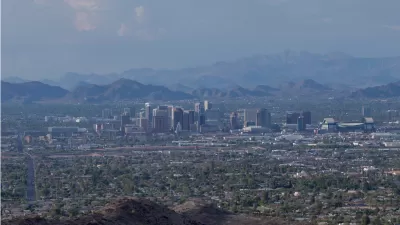Emma Marris reviews a new book by Andrew Ross, a cultural critic at New York University, that tries to understand how Phoenix came to be what it is, and determine whether there's any way it can be turned around.
Rather than focusing on the sustainability success stories being advanced by the converted in cities like Portland and San Francisco, Ross suggests that more important lessons about large scale climate change intervention can be gained from observing efforts to introduce green initiatives in cities like Phoenix, which are, "the weakest links in a chain that has to be strengthened tenfold" if the planet is to remain livable in the face of climate change." And this is the focus of Ross's new book, Bird on Fire: Lessons from the World's Least Sustainable City
As Marris notes, the challenges faced by Phoenix are daunting, "it uses a huge amount of water for a desert community -- more than twice the per capita rate of Seattle, which gets nearly 39 inches of rainfall a year -- and pumps most of it more than 300 miles uphill from the overtaxed Colorado River. Its air is brown with smog; its shadeless concrete landscape absorbs heat. And its black and Latino neighborhoods are cesspools of toxic waste."
And sustainable solutions to those challenges will be hard to come by within the city's traditional model for economic development based on continued outward physical growth. Sadly, in interviews with the real estate powers that be, Ross finds that they are, "more excited about designing green on a blank slate than doing the complex and less glamorous work of increasing density in the central city," which is perhaps the only way for the city to grow sustainably.
In the end, however, Ross seems skeptical of the prospects for achieving sustainability with any type of growth. According to Marris, "[h]e does not believe in the notion of sustainable growth. True sustainability, he argues, consists of rejecting growth and -- crucially -- achieving social equality. Over and over he returns to the notion that you can't buy your way out of an environmental hole with cool gadgets marketed to middle-class people."
Thanks to Scott Dodd
FULL STORY: Bird on Fire: Lessons from the World's Least Sustainable City (Book Review)

Alabama: Trump Terminates Settlements for Black Communities Harmed By Raw Sewage
Trump deemed the landmark civil rights agreement “illegal DEI and environmental justice policy.”

Planetizen Federal Action Tracker
A weekly monitor of how Trump’s orders and actions are impacting planners and planning in America.

The 120 Year Old Tiny Home Villages That Sheltered San Francisco’s Earthquake Refugees
More than a century ago, San Francisco mobilized to house thousands of residents displaced by the 1906 earthquake. Could their strategy offer a model for the present?

LA’s Tree Emergency Goes Beyond Vandalism
After a vandal destroyed dozens of downtown LA trees, Mayor Karen Bass vowed to replace them. Days later, she slashed the city’s tree budget.

Sacramento Leads Nation With Bus-Mounted Bike Lane Enforcement Cameras
The city is the first to use its bus-mounted traffic enforcement system to cite drivers who park or drive in bike lanes.

Seattle Voters Approve Social Housing Referendum
Voters approved a corporate tax to fund the city’s housing authority despite an opposition campaign funded by Amazon and Microsoft.
Urban Design for Planners 1: Software Tools
This six-course series explores essential urban design concepts using open source software and equips planners with the tools they need to participate fully in the urban design process.
Planning for Universal Design
Learn the tools for implementing Universal Design in planning regulations.
Ada County Highway District
Clanton & Associates, Inc.
Jessamine County Fiscal Court
Institute for Housing and Urban Development Studies (IHS)
City of Grandview
Harvard GSD Executive Education
Toledo-Lucas County Plan Commissions
Salt Lake City
NYU Wagner Graduate School of Public Service



























